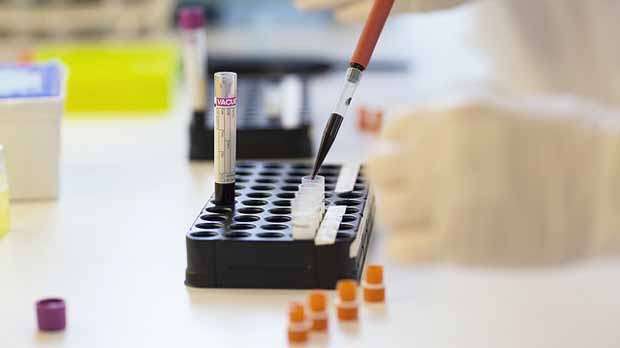Researchers in Belgium trying to improve a blood test used to spot foetal disorders have found unexpected signs of cancer in three of the 4000 pregnant women on their study.
UK experts said the findings were 'important', but stressed that there was a long way to go before the work could be harnessed to routinely improve cancer diagnosis or treatment.
Non-invasive pre-natal testing, or NIPT, is used to test for conditions such as Down's syndrome before birth. It works by looking for certain changes in a foetus's DNA that can be isolated from the mother's blood.
It is not generally used on the NHS but is available privately.
Dr Nathalie Brison, from the Centre for Human Genetics in Leuven, Belgium, said her team initially set out to improve the accuracy of the test.
"Even though [NIPT] is very reliable, we believed that we could make it even better," she said.
A key challenge was to try to test for a wider range of genetic abnormalities.
Using their experimental test in more than 4000 women, the team identified abnormalities in three of them that could not be linked to either the mother or her foetus.
Further analysis revealed DNA changes that "bore a resemblance to those found in cancer, and [we] referred the women to the oncology unit," said Brison.
After whole body MRI scanning and subsequent tissue analysis, the three women were diagnosed with ovarian cancer, a follicular lymphoma, and a Hodgkin lymphoma.
Two out of the three women were treated, one of them during pregnancy. She subsequently gave birth to a healthy girl.
Follow-up investigations in the treated women showed that their DNA profiles became normal again during and after chemotherapy. This, the researchers say, suggests that the technique had the added advantage of monitoring how effective the treatment is.
The third woman had an 'indolent' (slow growing) lymphoma that did not immediately need treatment.
Professor Jacqui Shaw, a Cancer Research UK expert in tumour DNA analysis, said: "These important findings highlight the growing evidence that a cancer's abnormal DNA may be present in a person's blood, and that this could be used to help diagnose, track and the disease. This includes detecting an undiagnosed cancer during pregnancy, allowing for treatment during pregnancy.
"But larger studies will be needed to confirm these 'proof of concept' findings, and ensure this type of analysis is accurate before it could be tested in clinical trials."
The findings have already led to further research, including a study monitoring the blood of people with Hodgkin lymphoma after treatment.
The study was published in the journal JAMA Oncology.
More information: "Presymptomatic Identification of Cancers in Pregnant Women During Noninvasive Prenatal Testing" JAMA Oncol. Published online June 05, 2015. doi:10.1001/jamaoncol.2015.1883
"Non-invasive detection of genomic imbalances in Hodgkin/Reed-Sternberg cells in early and advanced stage Hodgkin's lymphoma by sequencing of circulating cell-free DNA: a technical proof-of-principle study." DOI: dx.doi.org/10.1016/S2352-3026(14)00039-8
Journal information: JAMA Oncology
Provided by Cancer Research UK



















